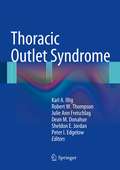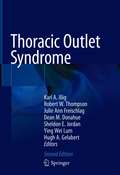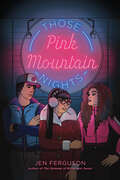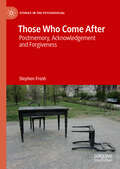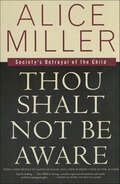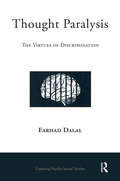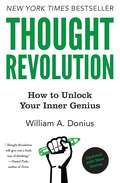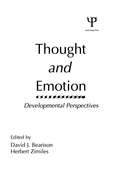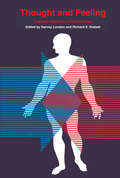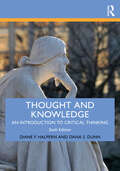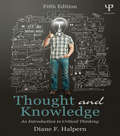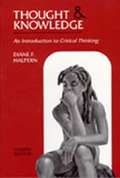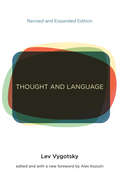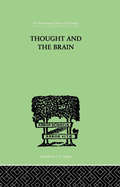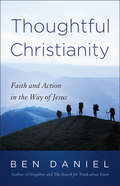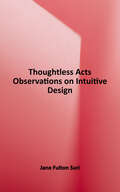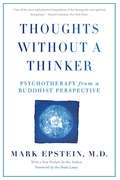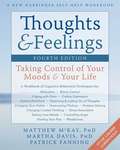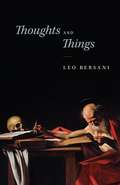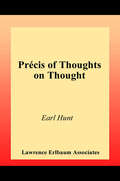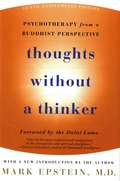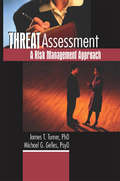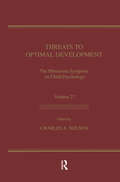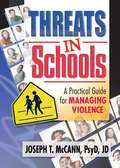- Table View
- List View
Thoracic Outlet Syndrome
by Julie Ann Freischlag Dean M. Donahue Karl A. Illig Peter I. Edgelow Robert W. Thompson Sheldon E. JordanThoracic Outlet Syndrome is an essential reference for physicians involved in the diagnosis, referral and treatment of the condition. Thoracic outlet syndrome (TOS) is made up of a constellation of problems resulting from pathology at the thoracic outlet in the neck. Busy specialty practice see multiple affected patients in every clinic, however TOS can often be difficult to diagnosis. This book explores all possible ancillary care issues surrounding this complex condition, including rehabilitation, disability, natural history, and medicolegal issues, and aims to stimulate research, discussion, and a sense of community between professionals involved in this area. Vascular, thoracic, and neurosurgeons, neurologists, psychiatrists and psychologists, physical therapists, occupational medicine specialists, and pain specialists alike, will find this book to be a must have for successfully treating, referring and diagnosing TOS in clinical practice.
Thoracic Outlet Syndrome
by Julie Ann Freischlag Dean M. Donahue Karl A. Illig Robert W. Thompson Sheldon E. Jordan Ying Wei Lum Hugh A. GelabertThis extensively revised edition is an essential reference for physicians involved in the diagnosis, referral and treatment of the thoracic outlet syndrome (TOS). TOS is made up of a constellation of problems resulting from pathology at the thoracic outlet in the neck. Busy specialty practice sees multiple affected patients in every clinic, but TOS can often be difficult to diagnosis. Thoracic Outlet Syndrome explores all possible ancillary care issues surrounding this complex condition, including rehabilitation, disability, natural history and medicolegal issues, and aims to stimulate research, discussion and a sense of community between professionals involved in this area. Vascular and thoracic surgeons, neurosurgeons, neurologists, psychiatrists and psychologists, physical therapists, occupational medicine specialists and pain specialists will find this book a must read for successful treatment, referral and diagnosis of TOS in clinical practice.
Those Pink Mountain Nights
by Jen FergusonIn her remarkable second novel following her Governor General’s Award-winning debut, The Summer of Bitter and Sweet, Jen Ferguson writes about the hurt of a life stuck in past tense, the hum of connections that cannot be severed, and one week in a small, snowy town that changes everything. Overachievement isn’t a bad word—for Berlin, it’s the goal. She’s securing excellent grades, planning her future, and working a part-time job at Pink Mountain Pizza, a legendary local business. Who says she needs a best friend by her side?Dropping out of high school wasn’t smart—but it was necessary for Cameron. Since his cousin Kiki’s disappearance, it’s hard enough to find the funny side of life, especially when the whole town has forgotten Kiki. To them, she’s just another missing Native girl.People at school label Jessie a tease, a rich girl—and honestly, she’s both. But Jessie knows she contains multitudes. Maybe her new job crafting pizzas will give her the high-energy outlet she desperately wants.When the weekend at Pink Mountain Pizza takes several unexpected turns, all three teens will have to acknowledge the various ways they’ve been hurt—and how much they need each other to hold it all together. Jen Ferguson burst onto the YA scene with her first novel, which was a William C. Morris Award Finalist and a Stonewall Award Honor Book, and this second novel fulfills her promise as one of the most thoughtful and exciting YA writers today.
Those Who Come After: Postmemory, Acknowledgement and Forgiveness (Studies in the Psychosocial)
by Stephen FroshThis book explores the legacies of suffering in relation to ‘those who come after’ – the descendants of victims, survivors and perpetrators of traumatic events. It draws on recent discussions of ‘postmemory’ and ‘haunting’ that are concerned mainly with the transgenerational impact of personal and social trauma. It examines how we are connected to past events for which we have no direct responsibility yet in which we might in some way be ‘implicated’ and it asks how we might attain a position of active witnessing that helps resolve the suffering of others. Those Who Come After includes vivid accounts of witnessing from a variety of perspectives, ranging from Biblical and Jewish stories to contemporary art and music. The book draws on psychosocial studies and psychoanalysis to help make sense of this material and to develop an understanding of acknowledgment and responsibility that is both ethical and emancipatory. Those Who Come After will be of great interest to readers in psychosocial studies and psychoanalysis and to all who are concerned with the question of how to put past suffering to rest.
Thou Shalt Not Be Aware: Society's Betrayal of the Child
by Alice MillerA strong criticism of Sigmund Freud’s research regarding sexually abused children, from the bestselling author of The Drama of the Gifted Child.Originally published in 1984, Thou Shalt Not Be Aware explodes Freud’s notions of “infantile sexuality” and helps to bring to the world’s attention the brutal reality of child abuse, changing forever our thoughts of “traditional” methods of child-rearing. Dr. Alice Miller exposes the harsh truths behind children’s “fantasies” by examining case histories, works of literature, dreams, and the lives of such people as Franz Kafka, Virginia Woolf, Gustave Flaubert, and Samuel Beckett. Now with a new preface by Lloyd de Mause and a new introduction by the author, Thou Shalt Not Be Aware continues to bring an essential understanding to the confrontation and treatment of the devastating effects of child abuse.Praise for Thou Shalt Not Be Aware“Epoch-making . . . Alice Miller’s courage, warmth, experienced intuition and candor yield fascinating insights.” —The Boston Globe“A provocative critique of traditional therapy’s view of childhood . . . This is explosive stuff. I can’t imagine anyone coming away from this book without several newfound discoveries about herself and her relation to her parents.” —Glamour“Thou Shalt Not Be Aware is that rarest of gems, a highly creative and exciting work which throws a multifaceted light upon the development of human nature in the Western World.” —Ashley Montagu“Alice Miller is not out to “hang the bastards,” but rather to help create a world of self-conscious and self-loving individuals who don’t need, want or know how to abuse others.” —San Francisco Chronicle“It is timely. It is powerful. It is painful . . . absorbing, enlightening and provoking.” —Charlotte Observer
Thought Paralysis: The Virtues of Discrimination (Exploring Psycho-social Studies)
by Farhad DalalGiven the enormous struggles, efforts and money expended on the equalities enterprise, why has more progress not been made? And further, why have things actually become worse in some circumstances? It is argued this has occurred because:- The values of Equality have been bureaucratized, allowing the liberal principle of "live and let live" to be perverted and put in the service of fear and control.- The Diversity discourse has been hijacked by the libertarians and put in the service of increasing profit, under the guise of liberty and inclusivity.- The equality movements have become apolitical, sidetracked into the project of the indiscriminate celebration and preservation of cultures, in lieu of challenging the status quo within cultures as much as between them.- The versions of psychology and sociology that the equality movements have drawn on are over simple
Thought Revolution - Updated with New Stories: How to Unlock Your Inner Genius (Thought Revolution Ser.)
by William A. DoniusDiscover your hidden brainpower with this newly expanded guide to the simple but powerful technique that unlocks potential in all areas of your life.Former banker and CEO Bill Donius drove his bank's eightfold growth over twelve years. And the surprising secret to his success is something we all have access to, right in our own two hands. The methodology described in Thought Revolution is simple and revolutionary--so simple, it begins by moving your pen from one hand to the other. Whether you're right-handed or left-handed, a whole world of change is possible. Writing with your non-dominant hand opens you up to creative solutions, giving you the ability to see new ways through problems in your business, career, relationships, health, and spiritual life. In Thought Revolution, Donius explains the science behind non-dominant handwriting and teaches you how to incorporate the technique into your business and your life. New stories from Donius's extensive seminars illuminate how employees and managers can unite in a new vision for their company's growth and culture, increase employee and customer satisfaction, and improve profits. Thought-provoking, easy-to-do exercises and prompts show how to connect more fully with your subconscious right brain to help you reduce stress, discover your hidden talents, heal from trauma, and come to a deeper spiritual awareness. Thought Revolution shows how your non-dominant hand serves as a direct pipeline to the right brain's wisdom. Incorporate this simple practice into your career and your life, and you'll find insights that lead to lasting change.
Thought and Emotion: Developmental Perspectives (Jean Piaget Symposia Series)
by David J. Bearison Herbert ZimilesFirst published in 1985. Routledge is an imprint of Taylor & Francis, an informa company.
Thought and Feeling: Cognitive Alteration of Feeling States
by Richard E. Nisbett Harvey LondonRecently there has been growing awareness and acceptance of the proposition that people do not exist in a world of physically defined forces and events, but in a world defined by their own perceptions, cognitions, conclusions, and imaginations. We respond and react not to some objectively defined set of stimuli, but to our own apperceptions of stimuli that we define subjectively. The original essays in this volume center on one aspect of this process of attribution: The extent to which the perception of events and causes results in the determination, modification, or alteration of emotions, feelings, and affective states.This book is divided into five sections, each of which elucidates and extends these theoretical conceptions. Part 1 provides a historical background and analytical framework for the rest of the book. Part 2 presents chapters dealing with the sorts of internal cues which may give rise to a feeling state. Part 3 presents a chapter discussing the evaluative needs aroused by the internal cues. Part 4 is concerned with the process of explanation triggered by the evaluative needs. Part 5 deals with various external cues and how they are used to label the internal feeling state. There is a concluding discussion of the cognitive alteration of feeling states.The authors deal with aggression, boredom, obesity, the control of pain, and delusional systems. This volume is of continuing importance to clinical and experimental psychologists as well as social psychologists. Each of the authors takes the theoretical concept of cognition and relates it to research in biofeedback, physiology, social psychology, altered states of consciousness, etc. Thus, the book bridges the gap between cognitive theory and the use of that theory in applied research.
Thought and Knowledge: An Introduction to Critical Thinking
by Dana S. Dunn Diane F. HalpernThought and Knowledge applies theory and research from the learning sciences to teach students the critical thinking skills that they need to succeed in today’s world. The text identifies, defines, discusses, and deconstructs contemporary challenges to critical thinking, from fake news, alternative facts, and deep fakes, to misinformation, disinformation, post-truth, and more. It guides students through the explosion of content on the internet and social media and enables them to become careful and critical evaluators as well as consumers. The text is grounded in psychological science, especially the cognitive sciences, and brought to life through humorous and engaging language and numerous practical and real-world examples and anecdotes. This edition has been streamlined with thoughtful consideration over what content to keep, what to cut, and how much new and current research to add. Critical thinking skills are presented in every chapter, empowering students to learn more efficiently, research more productively, and present logical, critical, and informed arguments. The skills are reviewed at the end of the chapter, and a complete list of skills with definitions and examples are included in the appendix. The text is supported by a companion website that features a robust set of instructor and student resources: www.routledge.com/cw/halpern. Thought and Knowledge can be used as a core text in critical thinking courses offered in departments of psychology, philosophy, English, or across the humanities and social sciences, or as a supplement in any course where critical thinking is emphasized.
Thought and Knowledge: An Introduction to Critical Thinking
by Diane F. HalpernThis best-selling textbook, written by award-winning educator and past president of the American Psychological Association, Diane F. Halpern, applies theory and research from the learning sciences to teach students the thinking skills they need to succeed in today's world. This new edition retains features from earlier editions that have helped its readers become better thinkers. A rigorous academic grounding based in cognitive psychology is presented in a clear writing style with a humorous tone and supported by numerous practical examples and anecdotes. Thought and Knowledge, Fifth Edition has been revised to help students meet the challenges of a global neighborhood and make meaningful conclusions from the overwhelming quantity of information now available at the click of a mouse. The skills learned with this text will help students learn more efficiently, research more productively, and present logical, informed arguments. Thought and Knowledge, Fifth Edition is appropriate for use as a textbook in critical thinking courses offered in departments of psychology, philosophy, English, humanities, or as a supplement in any course where critical thinking is emphasized.
Thought and Knowledge: An Introduction to Critical Thinking (4th Edition)
by Diane F. HalpernThis best-selling textbook, written by award-winning educator and past president of the APA, Diane Halpern, applies theory and research from the learning sciences to teach students the thinking skills they need to succeed in today's world. This new edition retains features from earlier editions that have helped its readers become better thinkers. A rigorous academic grounding based in cognitive psychology is presented in a clear writing style with a humorous tone and supported by numerous practical examples and anecdotes. Thought & Knowledge, Fourth Edition has been revised to help students meet the challenges of a global neighborhood and make meaningful conclusions form the overwhelming quantity of information now available at the click of a mouse. The skills learned with this text will help students learn more efficiently, research more productively, and present logical, informed arguments. New features include: *Template for Making Arguments. This is a crucial preparation tool for students in any subject area. For those planning on continuing to Graduate School, this feature is an essential reference. The Graduate Record Examination (GRE) now requires that all test takers write an argument on a contemporary topic. *Concept Maps provide students with strategies to clarify complex information and retain long-term knowledge. *Contemporary Examples,throughout the text, relate current events to the book discussions. *Explanations on How to Evaluate Information found on Web sites. *Revised Student Workbook. Thinking Critically About Critical Thinking, Fourth Edition is filled with new exercises to reinforce learning and practice newly acquired skills. This workbook can be purchased in a student package with the text or as a separate item. Thought & Knowledge, Fourth Edition is appropriate for use as a textbook in critical thinking courses offered in departments of psychology, philosophy, English, humanities, or as a supplement in any course where critical thinking is emphasized.
Thought and Language, revised and expanded edition
by Lev S. VygotskyA new edition of a foundational work of cognitive science that outlines a theory of the development of specifically human higher mental functions.Since it was introduced to the English-speaking world in 1962, Lev Vygotsky's Thought and Language has become recognized as a classic foundational work of cognitive science. Its 1962 English translation must certainly be considered one of the most important and influential books ever published by the MIT Press. In this highly original exploration of human mental development, Vygotsky analyzes the relationship between words and consciousness, arguing that speech is social in its origins and that only as children develop does it become internalized verbal thought.In 1986, the MIT Press published a new edition of the original translation by Eugenia Hanfmann and Gertrude Vakar, edited by Vygotsky scholar Alex Kozulin, that restored the work's complete text and added materials to help readers better understand Vygotsky's thought. Kozulin also contributed an introductory essay that offered new insight into Vygotsky's life, intellectual milieu, and research methods. This expanded edition offers Vygotsky's text, Kozulin's essay, a subject index, and a new foreword by Kozulin that maps the ever-growing influence of Vygotsky's ideas.
Thought and the Brain (International Library Of Psychology Ser.)
by Piron, HenriFirst Published in 1999. Routledge is an imprint of Taylor & Francis, an informa company.
Thoughtful Christianity
by Ben Daniel"The next revival must be an awakening in the intellect of Christians ready to mark the life of the church and of the broader society with a thoughtful faith. " Thoughtful Christianity provides a guide to Christian faith that honors tradition while embracing modern thought and valuing critical reflection. Daniel examines the extreme polarization of Christianity in the last century and argues that American Christians are in need of an awakening of the mind. He suggests a way of life that includes commitment to education, high value placed on curiosity, and instruction from "those with the courage to be corrected. " Divided into three parts, the book explores how science can inform faith, the marks of a thoughtful life, and some suggestions for living a thoughtful life. Daniel shows us how we can move forward, unbound by labels, to know and serve God better.
Thoughtless Acts?: Observations on Intuitive Design
by Jane Fulton SuriFrom IDEO, the global innovation and design firm responsible for such landmark products as Apple's first computer mouse, comes a primer in the observation method that keeps their practice human-centered and ever ingenious. People unconsciously perform ultraordinary actions every day, from throwing a jacket over a chair back to claim the seat, or placing something in their teeth when all hands are full. These "thoughtless acts" reveal the subtle but crucial ways people behave in a world not always perfectly tailored to their needs. Thoughtless Acts? is a collection of dozens of (often humorous) snapshots capturing such fleeting adaptations and minor exploitations. This method of observation demonstrates the kind of common-sense approach that can inspire designers and anyone involved in creative endeavors. Thoughtless Acts? is a privileged peek at how IDEO creates the people-friendly products, services, and spaces for which they are widely recognized.
Thoughts Without A Thinker: Psychotherapy from a Buddhist Perspective
by Mark EpsteinThe line between psychology and spirituality has blurred, as clinicians, their patients, and religious seekers explore new perspectives on the self. A landmark contribution to the field of psychoanalysis, Thoughts Without a Thinker describes the unique psychological contributions offered by the teachings of Buddhism. Drawing upon his own experiences as a psychotherapist and meditator, New York-based psychiatrist Mark Epstein lays out the path to meditation-inspired healing, and offers a revolutionary new understanding of what constitutes a healthy emotional life.
Thoughts and Feelings, Fourth Edition: Taking Control of Your Moods and Your Life
by Patrick Fanning Martha Davis Matthew McKay'Thoughts & Feelings' adapts the powerful and versatile techniques of cognitive behavioural therapy (CBT) into a set of tools readers can use, not to solve a particular problem, but to overcome any of the emotional and behavioural changes that life throws their way.
Thoughts and Things
by Leo BersaniLeo Bersani's career spans more than fifty years and extends across a wide spectrum of fields--including French studies, modernism, realist fiction, psychoanalytic criticism, film studies, and queer theory. Throughout this new collection of essays that ranges, interestingly and brilliantly, from movies by Claire Denis and Jean-Luc Godard to fiction by Proust and Pierre Bergounioux, Bersani considers various kinds of connectedness. "Thoughts and Things" posits what would appear to be an irreducible gap between our thoughts (the human subject) and things (the world). Bersani departs from his psychoanalytic convictions to speculate on the oneness of being--of our intrinsic connectedness to the other that is at once external and internal to us. He addresses the problem of formulating ways to consider the undivided mind, drawing on various sources, from Descartes to cosmology, Freud, and Genet and succeeds brilliantly in diagramming new forms as well as radical failures of connectedness. Ambitious, original, and eloquent, "Thoughts and Things" will be of interest to scholars in philosophy, film, literature, and beyond.
Thoughts on Man
by William GodwinTHOUGHTS ON MAN HIS NATURE, PRODUCTIONS AND DISCOVERIES INTERSPERSED WITH SOME PARTICULARS RESPECTING THE AUTHOR
Thoughts on Thought
by Earl HuntThis is an introduction to cognitive science intended for use as a textbook for advanced undergraduate and/or graduate-level courses. In it, the author presents the major experiments and theoretical arguments in cognitive psychology in some detail. Where appropriate, alternative theoretical arguments are offered, and in some cases the author explains that there are interesting questions to which psychologists do not yet have the answers. This book is packaged in an innovative manner. The 170-page printed textbook is actually a précis of a much longer manuscript, which is produced in the form of a CD-ROM bound into the back of the book. Each chapter of the précis references the more detailed coverage and full-color illustrations which are contained on the CD-ROM, which is provided for readers who wish to delve more deeply into the material.
Thoughts without a Thinker
by Mark EpsteinThoughts Without a Thinker is the landmark book that brought the worlds of Buddhism and psychotherapy into contact with each other, and changed thousands of lives. Drawing upon his own experience as therapist, meditator, and patient, Mark Epstein, a New York-based psychiatrist trained in classical Freudian methods, integrates Western psychotherapy and the teachings of Buddhism. In accessible, intimate language, this enlightening guide explains the unique psychological contributions of the teachings of Buddhism, describes the path of meditation in contemporary psychological language, and lays out the possibility of a meditation-inspired psychotherapy. Mark Epstein's new introduction reflects on the impact of the book and on the evolving relationship between psychotherapy and Buddhism.
Threat Assessment: A Risk Management Approach
by James T Turner Michael GellesDetailed "how to's" of threat assessment-from the initial contact to the sharing of results! Risk management can be an organizational nightmare, but it is an essential part of your operations. Recent events have shown us that organizations need to know how to respond swiftly and effectively in emergencies and that companies need to protect their employees from internal and external threats. This book provides you with the tools you need to protect both your employees and yourself from a variety of threats. Threat Assessment: A Risk Management Approach examines the factors that human resource, security, legal, and behavioral professionals need to understand in work violence and threat situations that disrupt the working environment, revealing the best ways to reduce risk and manage emergencies. It includes case studies and hypothetical examples that show recommended practices in action and provides detailed interviewing methods that can increase the efficiency of current strategies. Helpful appendices provide sample forms for identification cards, stay-away letters, workplace behavior improvement plans for problem employees, questions for health care providers, and announcements for employees regarding security changes. An extensive bibliography points the way to other useful material on this subject. Threat Assessment: A Risk Management Approach explores: the role of the multidisciplinary threat management team corporate liaisons with law enforcement agencies cyberthreats and stalking insider threats category classification of offending behaviors Risk management is a constantly evolving field, and Threat Assessment provides you with access to the latest updates. Staying up-to-date on risk management innovations will help you increase corporate sensitivity to possible threats and provide the safest possible working environment to your employees. The authors of Threat Assessment are seasoned professionals with extensive experience in risk management. You can learn from their expertise and adapt it to your situation, improving workplace safety and contributing to security in your own community.
Threats To Optimal Development: Integrating Biological, Psychological, and Social Risk Factors: the Minnesota Symposia on Child Psychology, Volume 27 (Minnesota Symposia on Child Psychology Series #Vol. 27)
by Charles A. NelsonPsychology's recent immersion in risk research has introduced a new variant in which the focus is not solely on disease, but also on the effects and consequences produced by the multiple aspects of risk on individual adaptation. Variations in such patterns of adaptation signal the entrance of protective factors as an added element to the clinical and research focus in the prediction of positive versus negative outcomes under the duress of stressful experiences. Given psychology's investment in the entire range of human adaptation--embracing severe disorder at one extreme and strong positive adaptations at the other--it is not surprising to find this new element of compensatory protective factors as a reshaping factor in the field of risk research. It is one that recognizes and studies the relevance of risk influences on disorder, but also focuses on recovery from disorder or the absence of disorder despite the presence of risk. This latter element implicates the notion of "resilience." It is this opening of the field of risk research that seems to bear the heavy and welcome imprint of psychology. Fundamental to the study of protective factors in development, however, is a broad knowledge base focused on risk factors that often contain the healthy development of infants and children. This volume reflects a continuation of the concerns of the Institute of Child Development with the nature and content of development in multiple contexts. It comes at a most welcome point since the Institute--in collaboration with the University of Minnesota's Department of Psychology--now participates in a jointly shared graduate training program in clinical psychology which stimulates and supports the growth of a newly emergent developmental psychopathology. For this field to advance will require a broad perspective and acceptance of the significance of the diversity of risk factors that extends throughout the life span and results in developmental trajectories that implicate various biological, psychological, and sociocultural risk elements.
Threats in Schools: A Practical Guide for Managing Violence
by Joseph T MccannManage potentially violent situations in your school with these expert techniques!In the wake of several highly publicized school shootings, the problem of school violence has increasingly become a focus of concern for the general public as well as teachers, school officials, and students. Drawing on case studies from publicized violent incidents as well as from Dr. McCann's private practice, Threats in Schools: A Practical Guide for Managing Violence provides techniques for identifying, conceptualizing, assessing, and managing threatening behavior by students in school settings. Offering specific case management strategies for a variety of situations, this indispensable volume provides guidance on formulating questions to ask and suggestions for developing strategies for managing potentially violent situations.Integrating threat assessment and risk management models, this approach will help you target potential threats to property, other students, teachers, and school staff. The interdisciplinary approach recognizes that violent behavior is dependent on the characteristics of the perpetrator, victim, and setting, and that the relationship between threats and violence is not always clear. Threats in Schools offers well-grounded research, detailed case studies, and theoretical approaches to help you deal with the tough issues, including: zero-tolerance policies and their more effective alternatives why profiling techniques to identify violence-prone students are of limited use interventions to defuse potentially violent situations critical incident stress managementFive appendixes offer forms and checklists to help you plan and evaluate, including: threat assessment and management planning checklist of characteristics of perpetrators of school violence questions for evaluating general risk of violence fire-setting and bombing risk assessment sex offense risk assessmentLucidly written and illustrated with helpful tables and figures, Threats in Schools offers school officials, mental health professionals, community leaders, and the media the information they need to understand what sparks school violence and which approaches reduce the risk of it.
